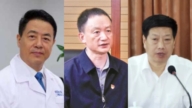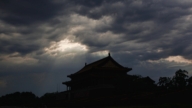【新唐人2013年08月06日訊】大陸政壇重要場合北戴河暑期辦公即將展開,中共高層將雲集北戴河。台灣《中央社》透露,比照往年,今年的北戴河會議仍將安排觀影活動,目前已有4部片子送抵,包括不能在大陸公映的2012年的法國情慾禁片《登堂入室》(Dans la maison)。此外,一些不適合公映或者尚未通過審查的電影,也會被安排進入北戴河觀影名單。與中共高層有頻繁接觸的大陸學者指出,觀看禁片一向是中共領導人的特權。
《中央社》引述知情人士的話透露,《登堂入室》(Dans la maison)未在大陸公開上映,僅在7月間,中共國家新聞出版廣電總局下屬的中國電影資料館曾以學術觀摩名義放映過。該片圍繞一對師生的作文講習展開故事,外間評價說,「導演巧妙拼接偷窺文學與撲朔迷離的現實斷面,用似真似幻、充滿層次感的創作故事挑戰情慾道德禁區」。
《登堂入室》還充斥了大量中國元素:畫廊內中國藝術家創作的上海的天空﹔劇中角色中國熱情、中國客戶、中國產品乃至中國發財夢。 而電影出現對毛澤東、斯大林、希特勒的模仿,據信是電影永遠不會在大陸上映的原因。
中國作家、中共元帥葉劍英的養女戴晴指出,按照《憲法》第35條,思想言論、公民自由都是受到保護的。她還認為,對資訊的了解以及對文化的接受,當局不應該因為一個人級別不同、身份不同而實施不同的透明度。
戴晴:「但是自從1949年以來,他們從來都是這樣做的。在文革的時候,簡直全中國的人,大家只能看八個樣板戲。江青她可以調任何所有的片子,就是因為各種片子都是從電影資料庫裡面走。所以她想調甚麼就調甚麼。從來他們都是這樣,沒有甚麼變化。」
原國務院農村發展研究中心研究員姚監復說,在中共統治的歷史上電影分兩類,一類是領導人看的、一類是給老百姓看的。姚監復曾經擔任前中共總書記趙紫陽的智囊。
姚監復:「所以江青在文化大革命的時候可以看很多電影,她可以找她認為信得過的人看。政治性的,藝術性的,甚至色情的,她都可以看。他們希望知己知彼,也知道歷史。所以從江青,從毛澤東開始就看禁片。他們不能讓群眾看,但是他們自己看。」
《中央社》還報導說,一些不適合公映或者尚未通過審查的電影,也會被安排進入北戴河觀影名單。1987年的北戴河會議期間,未公演的《芙蓉鎮》便放映給時任中共總書記的趙紫陽觀看。
姚監復向《新唐人》透露趙紫陽觀看《芙蓉鎮》的情形。
姚監復:「給趙紫陽看的時候,趙紫陽看完站起來就要走,結果請他看電影的負責審查電影的這些部門的人說,紫陽同志,你還沒提意見呢,趙紫陽說:電影,如果要我們審查批准,我以後就不來看了。所以從《芙蓉鎮》以後,在趙紫陽當政的時候沒有審查過一部電影。這是鮑彤跟我說的。」
姚監復分析,如果北戴河會議的確將要召開的話,那麼是為三中全會做準備。他指出,三中全會在中共歷史上歷來是很重要的會議。一中全會是確定共產黨的領導人選,二中全會是確定人大和政府的領導人選。三中全會是確定改革日程。但是姚監復認為,中共這一次不會談牽涉到一黨專政的政治體制改革,而只會談論經濟改革。
姚監復:「中國(共)現在不可能進行政治體制改革,如果進行一黨專政的改革,你不是要把共產黨趕下臺嗎?中共領導人沒有蔣經國的思想深度,就是永遠沒有一個黨能夠永遠執政的,古今中外歷史沒有。蔣經國認識到這一點。共產黨是(希望)中國共產黨萬歲,是要永久執政的合法性。」
姚監復表示,七不講也好、九號文件也好、四項原則也好、六項標準也好、兩個凡是也好,都是為了中共自己一黨專政的合法性。他說,趙紫陽表達過這樣的觀點:永久執政的理念不改變,就不是政治改革。
採訪編輯/秦雪 後製/李月
Erotic Film for CCP Officials During Beidaihe Gathering
High-level officials in the Chinese Communist Party
(CCP) will gather in Beidaihe, in their summer office.
According to Taiwan’s Central News Agency,
as in previous years,
this Beidaihe meeting will also arrange movies
for viewing, and four films had been delivered.
This includes the prohibited 2012 film
Dans la Maison, a banned French erotic film.
In addition, other films deemed unsuitable for release,
or uncensored films, will also be arranged for Beidaihe.
Chinese scholars who have frequent contacts
with high-level CCP officials have highlighted
watching banned films has always been
a prerogative of the CCP leaders.
Central News Agency quoted informants that
Dans la Maison is not publicly released in China.
The film is only screened in the name of academic
consideration at the China Film Archive Building, under
the State Press and Publication Administration of Radio.
The film is about a writing workshop
between a teacher and a student.
Critics said, “the director cleverly splices
voyeur literature with confusing sections.
It challenges restricted moral areas
with real magical, layered stories.”
The film has many references to China. The
Chinese artists have “Shanghai Sky" in the gallery.
It also includes enthusiasm for China, Chinese
customers, Chinese products, and even
represented the Chinese dream of getting rich.
The film representations of Mao, Stalin, and
Hitler, which is believed to be the reason why
“the movie will never be released in China”.
Chinese writer Dai Qing, the adopted daughter
of CCP Marshal Ye Jianying spoke about this issue.
In accordance with Article 35 of the Constitution,
thought, speech, and civil liberties are all protected.
She also believes that her understanding of
information, and acceptance of culture, should
not have different transparency due to peoples
different levels and different identities.
Dai Qing: “Since 1949, they have always been doing so.
During the Cultural Revolution, almost all people
in China can only watch eight model operas.
Jiang Qing can see any film, because a
variety of films are from the movie database.
So they could see whichever movie they wanted.
It had always been like this, and nothing changed.”
Yao Jianfu, a former researcher of the Research
Center of State Rural Development commented.
In the history of the CCP, there were two types of movies.
One type is for the leaders, and
the other type is for the people.
Yao Jianfu served as a think tank of the
former CCP General Secretary Zhao Ziyang.
Yao Jianfu: “So Jiang Qing could watch
many movies during the Cultural Revolution,
and could watch with her trusted ones.
She could watch political, artistic, and even erotic
movies. They wanted to know about this, and of history.
So Jiang Qing and Mao Zedong began to see banned films.
They did not let people to watch, but they watched them.”
The Central News Agency also reported that some
movies are unsuitable for public release or uncensored.
These will also be arranged into Beidaihe movie list.
In 1987, in the Beidaihe meeting, “Hibiscus Town”,
which is not released to the public, was provided
to the former CCP General Secretary Zhao Ziyang.
Yao Jianfu revealed this situation to NTD Television,
about when Zhao Ziyang watched Hibiscus Town.
Yao Jianfu: “When it was shown to Zhao Ziyang,
Zhao stood up to leave after watching it.
But the person in charge of movie censorship
asked him to give some comments on the film.
Zhao said that if you wanted us to review and approve
movies, then I would not come to see it any more.
So after Hibiscus Town, when Zhao Ziyang
was in power, he did not review any movie.
This is what Bao Tong told me.”
Yao Jianfu analyzed that if the Beidaihe
meeting would be held for certain, then it is
a preparation for the Third Plenary Session.
He pointed out that the Third Plenary Session of
the CCP has always been a very important meeting.
The first plenary session is to determine
the candidates of the CCP leaders.
The Second Plenary Session determines candidates
of the National People’s Congress and government.
The Third Plenary session is
to determine the reform agenda.
Yao Jianfu believed that the CCP would not talk
about one-party dictatorship and political reform.
It will only talk about economic reforms.
Yao Jianfu: “It is now impossible
to have political reform in China.
If it carried out the reform of the one-party dictatorship,
and then isn’t it removing the CCP from power?
The CCP leaders did not have the
depth of thought of Mr. Jiang Jingguo.
That is, a party does not rule forever, it has been
so from ancient times until now. Jiang realized this.
The CCP hopes a long live for itself, and
the permanent legitimacy of the ruling party.”
Yao Jianfu said that no matter the seven things not
to speak about, or Number 9 document, or the four
principles, or six criteria, or two whatevers, they have
all served for the legitimacy of one-party dictatorship.
He said Zhao expressed this view, that if the idea of
permanent rule did not change, it was not political reform.





























